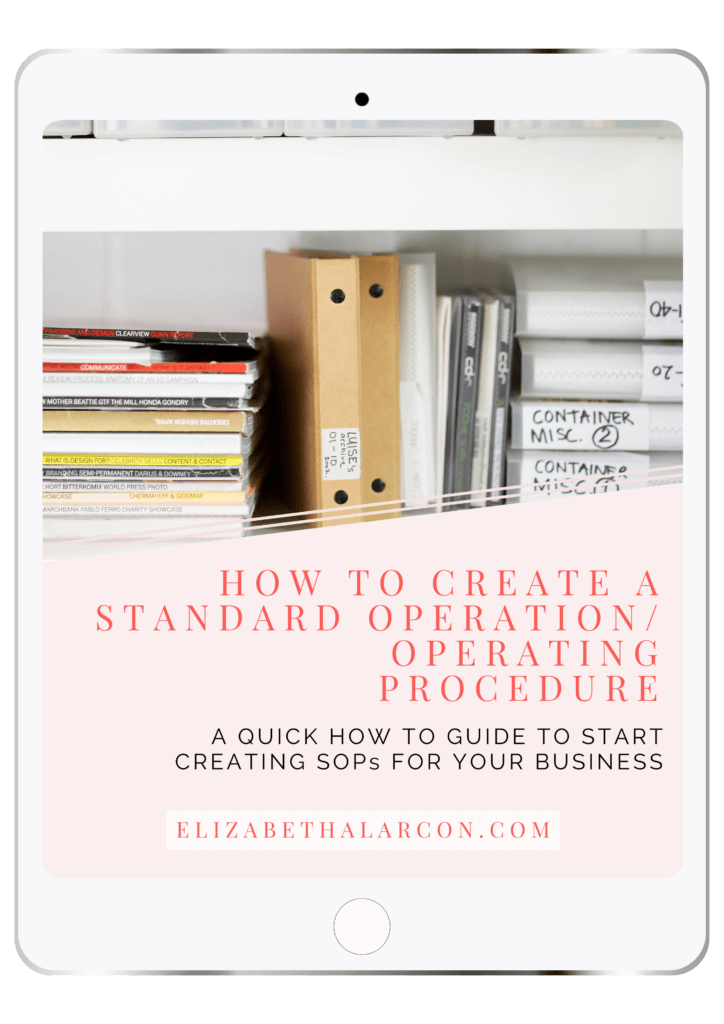The Key to Creating Efficient Business Systems That Will Help Your Business Grow and Scale
Many entrepreneurs focus on the physical aspects of their brand when it's time for them to scale. For example, some may purchase an expensive logo or app icon that lavishly ties in with their website color scheme and matches what customers see when browsing social media posts about them (and vice versa). While these elements do matter, you should also be thinking ahead:
What happens if something goes wrong while I'm away?
How will this affect my company’s image/reputation among potential clients & partners alike?
Can my company run efficiently if I have to be away for some time?
START CREATING SOPS FOR YOUR BUSINESS TODAY!
I've created a quick how-to guide on creating SOPs for your business. Grab this guide now and start organizing your business!
The answer is easy. You need to have an efficient system that will allow you to keep things running smoothly, even if you're not around.
Why Creating Efficient Business Systems Now Build A Solid Foundation for Growing and Scaling Your Business
Scaling can be intimidating for entrepreneurs running their businesses for a while. It's not just about getting more customers or employees – it means changing your processes and handling all those additional responsibilities on top of what you were doing before. This article will offer tips to help new solopreneurs manage their business as soon as possible without feeling overwhelmed by everything going into this big project simultaneously!
Scaling a business is complex, and many entrepreneurs are frustrated or overwhelmed with day-to-day tasks. However, it doesn't have to be that way! Scaling your business is no easy task, but you can manage it more efficiently with the right systems. Without efficient processes and tools for eliminating manual operations that are not helping drive growth as much as they should, – customers could slip through the cracks! However, you can manage your business more efficiently by establishing well-organized processes and utilizing tools.
Moreover, establishing these structures now will only help ensure greater success later. Having a set of systems that can be given to new hires, and they can get started, will save your hours in training. As you adopt these systems, you can delegate and work in your business and not ON your business.
Creating Efficient Business Systems Starts With You
The key to creating efficient business systems is knowing precisely what you do in your business and the steps that go with it. Too often, we keep our processes on a mental level, which results in inconsistency and lack of productivity; however, writing each step down allows for organization and increased efficiency by ensuring everything has been thought out beforehand.
If you have not created your systems manual or standard operating procedures (SOPs), here’s how to start.
The first step to creating your systems manual is understanding what you want and need. I recommend creating your manual or standard operating procedures for each area where work needs to be done.
Think of the tasks that keep your business running smoothly. These might include email newsletters, billing, and social media management – the areas where you can use some help! Then, add any new ones as they come up to create an actionable list with individual priorities for each category (e.g., financials vs. client care). Finally, break down these categories into smaller steps so nothing is left hanging when moving forward.
Ask yourself, what do you need to carry out this process efficiently?
It is crucial to map out each step in your business operations so that you can identify where there are gaps or areas of improvement. This way, if a task needs reassignment or another team member is needed for specific projects, they will know what next steps must be taken!
I recommend taking notes on paper as this allows more flexibility within your organization. It makes editing easier, too – which means there is less chance of making costly mistakes when updating tasks and processes throughout all production/project management phases. Taking detailed notes on every step of your daily business operations is essential. It could be the most minor thing, but it may lead you down a path that cannot be seen otherwise and will impact future endeavors if taken care of now!

The goal here isn't just about capturing what needs to be done; writing these out gives you clarity during any reassignment or hiring process. Those who need to know where they stand with current tasks can reassess their role before being assigned another one outside their skill set. This way, everyone wins – including us because there is no waste of time wondering why things weren’t completed like we thought they should.
Even if you don't write it down, at the very least, think about what processes you run through to get things done and make notes of these. If possible, have a conversation with your key staff (for me, that's my Chief Barking Officer, CeCe) to map out business operations so that you can create an accurate manual or SOPs based on what already exists.
Many benefits come with up-to-date systems; the biggest is scaling your business because you can delegate tasks effectively without worrying about conflicting results! Don't forget to always keep an eye on ways to improve these processes.
Creating your business system blueprint is much like building a house. Before moving forward, you must carefully plan the steps and ensure everything goes according to what you want. Still, there isn't an “exact” way of doing things because every company's needs differ, so find something that works well for you!
Once your processes are written out, organize your operations and procedures in a project management tool or document. Organizing your operations and procedures in a project management tool or document will give you an important head start on the whole process.
Organizing your operations is key to making them easily accessible. You need a central location for your blueprint. Without it, you won't be able to easily access any information from the different steps in each process, making things more difficult for yourself! Imagine wasting time looking for documents. I mean, the whole point of this exercise was to save you time!
I organize by starting with a category (i.e., marketing), moving down through business activity/steps until I reach individual tasks or jobs that must get done with specific tools used during execution time frames.
I find my way around quickly because of how well-organized everything has been set up already, but if anything is left out, I don't worry – I just use folders within those categories as needed.
Automation Is Your Friend
Now that you have laid out your general game plan, think of any processes you can take off your plate.
I wanted to eliminate things distracting me from what was necessary until it was time for them to come back full circle. So, instead of having the stress of invoicing clients, automation takes care of this by default via Dubsado each month.
Here's one example: Automating payment workflows makes life easier because payments don't need approval anymore; they're made automatically each month—and if something goes wrong with a customer's payment, there's a missed payment reminder email ready to go in the queue and another one if they missed the first email.
Here's another one: A client fills out the intake questionnaire on the site, including booking a Zoom meeting consultation call. The client receives an email with all the meeting deets, and another email notifies me that I have a lead to review the questionnaire answers. The lead workflow then adds a note with general questions to ask during the consultation call. Since Dubsado is synced to my calendar, the appointment is automatically added to my calendar, which blocks the time and sets a reminder. All I have to do is show up.
Take a look at your current processes and see if there's anything that can be automated so you don't have to spend hours every day on tedious tasks.
The feeling of being able to automate tasks is incredible. You'll find that once you have eliminated specific manual responsibilities, it will be easy for the rest of your business operations to run smoothly without any hiccups or disruptions in workflow! Automation helps free up time by taking away pesky little duties like social media posting and email marketing campaigns–so we can do these with ease now rather than spend precious minutes every day.
Automation gets a bad rap because automation is viewed as replacing humans with robots. In business, automation is merely an aid for humans to complete a task with greater accuracy and speed, which they could not have accomplished by themselves.
I guess you could say I'm a bit of an automation freak, but automating my business has been one of the best decisions I have ever made. For example, it is more efficient for me to run email marketing campaigns from an automated tool rather than schedule posts myself over several social media platforms. Still, it's also less restrictive because I can change platforms without resetting my data.
Once you understand what needs to be automated, you should move forward with the process, but do not overlap your automation projects! To avoid overlapping processes, always make sure everything is well-organized and current.
Maintaining Your Business Systems So They Never Become Outdated!
I communicate with my team about updates and process changes, but updating the systems ultimately falls on me. Before I make any updates or changes, I always run it by other people who work in different departments to get their feedback or input before moving forward. Ultimately, our goal is to achieve efficiency and productivity, and this will only happen if we create a smooth environment where everyone knows what they need to do and when they need to!
Remember, your company should update its systems whenever needed because the work world constantly changes.
Success is about setting and achieving your goals. You'll need systems for this, so don't forget them, or else things might fall apart quickly- remember to pick what works best for YOU and YOUR BUSINESS.
The most important thing you can do as a solopreneur is never to stop growing and learning because the only way to improve your business is through trial and error. Failing means you're trying, which means you're closer than ever to success! If something doesn't work, don't be afraid to change it immediately because that's how you'll figure out the best solution.
Conclusion
Creating efficient business systems is essential for helping your business grow and thrive. It's all about documenting the processes that keep everything running smoothly. Trust me, when you take the time to write things down, it makes a world of difference. You'll find clarity, organization, and the freedom to focus on what really matters—your big goals!
Think of it this way: having a solid system is like having a trusted roadmap for your business. You know where you’re going and won't get lost along the way. Plus, being clear on each step means less stress for you and your team.
So, get started! Map out those workflows, include your team in the process, and keep looking for ways to improve. Remember, every little effort you make now sets you up for success tomorrow. You've got this! Your future self will thank you for the solid foundation you’re building today.
Creating Efficient Business Systems FAQ
What are efficient business systems, and why are they essential for growth?
Efficient business systems are organized processes and workflows that ensure consistent and productive operations within a business. These systems are crucial for growth because they provide a clear framework for executing tasks, allowing businesses to scale without sacrificing quality. By streamlining operations, companies can focus on strategic objectives, reduce overhead costs, and improve overall productivity.
How do I begin creating efficient systems for my business?
To start creating efficient systems, you should first document the fundamental processes that are currently in place in your business. Identify repetitive tasks and outline the steps involved in each process. From there, these tasks will be categorized, standard operating procedures (SOPs) developed, and prioritized based on their impact on daily operations. This structured approach will enable better management and delegation as your business grows.
What is the significance of Standard Operating Procedures (SOPs) in business systems?
Standard Operating Procedures (SOPs) are vital in establishing consistency and quality across business processes. They serve as written guidelines that outline the specific steps to complete tasks. By implementing SOPs, businesses can ensure that all team members adhere to the same standards, thereby reducing errors and enhancing efficiency. Additionally, well-documented procedures aid in training new employees and can be easily updated as processes evolve.
How can technology enhance the efficiency of my business systems?
Technology can significantly enhance the efficiency of business systems through automation and project management tools. Automating repetitive tasks such as invoicing, email marketing, and project tracking can minimize manual errors and free up time for more strategic activities. Moreover, utilizing project management software allows for better task organization, effective communication among team members, and real-time tracking of project progress, resulting in streamlined operations and improved productivity.
How do I maintain and update my business systems to remain efficient?
Maintaining and updating business systems requires ongoing assessment and feedback. Regularly review your processes to identify areas for improvement or gaps in efficiency. Solicit input from your team, as those involved in day-to-day operations can provide valuable insights. Implement changes based on this feedback and ensure all procedure updates are documented and communicated to relevant team members. Staying proactive in updating your systems will help your business adapt to changing market conditions and maintain operational effectiveness.
What common challenges do businesses face when implementing efficient systems?
Businesses often encounter various challenges when implementing efficient systems, including employees' resistance to change, a lack of clarity regarding procedures, and inadequate training on new processes or tools. Additionally, some organizations may struggle to align their technology with operational needs or maintain consistent communication. To overcome these obstacles, it’s essential to foster a culture of adaptability, provide comprehensive training, and ensure effective change management strategies are in place.
Can small businesses benefit from creating efficient systems, or is it only for larger companies?
Small businesses can benefit significantly from creating efficient systems just as much as larger companies. Efficient systems are often more critical for small businesses because they typically have fewer resources for operational inefficiencies. Small businesses can build a strong foundation for growth and scalability by implementing organized processes early on, leading to competitive market advantages. Moreover, having efficient systems helps small business owners manage their time and resources more effectively, allowing them to focus on strategic initiatives.
How can delegating tasks improve my business efficiency?
Delegating tasks can significantly improve business efficiency by allowing you to focus on higher-value activities while distributing routine or lower-priority tasks among team members. Delegation encourages team collaboration and empowers employees to take ownership of their responsibilities, ultimately enhancing morale and productivity. Additionally, with well-defined processes and SOPs in place, delegation becomes more accessible and practical, enabling seamless execution and minimizing the risk of errors or miscommunication in task completion.
What role does employee training play in maintaining efficient systems?
Employee training is crucial in maintaining efficient systems because it ensures that all team members are well-versed in the processes and procedures established within the organization. Effective training programs equip employees with the skills and knowledge necessary to execute their tasks competently, fostering a culture of accountability and professionalism. Regular training sessions and refreshers help adapt to updates in systems and procedures, ultimately enhancing productivity and operational consistency.
How can businesses measure the effectiveness of their systems?
Businesses can measure the effectiveness of their systems through various key performance indicators (KPIs) and metrics that align with their specific objectives. Metrics such as operational efficiency, employee productivity, error rates, and customer satisfaction can provide valuable insights into how well processes function. Additionally, regular performance reviews and feedback loops, including employee and customer surveys, can help identify strengths and areas for improvement, enabling businesses to make data-driven decisions to enhance their systems over time.
THIS SITE USES AFFILIATE LINKS. THERE’S NO EXTRA COST TO YOU, BUT I RECEIVE A SMALL COMMISSION WHEN YOU USE THEM.
PIN ME!












💁🏻♀️ Community Guidelines
To ensure a positive and respectful environment for everyone, please take a moment to review our Community Guidelines. Following these guidelines helps us maintain a safe space for all.